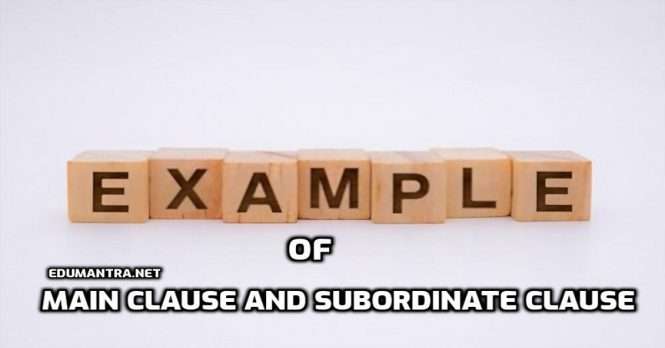We have Examples of Main Clause and Subordinate Clause are going to help you to learn clauses. This will help you in exams to score well and to get good result. Here you can find Exercise of Clause | with Answers & PDF
Examples of Main Clause and Subordinate Clause
1. Main Clause :
It is a group of words including a Subject and a Predicate, and it does not depend on any other clause for its meaning. In short ,this part of a sentence remains complete even if separated from the main sentence and can be spoken independently. It is also called Principal clause or Independent Clause.
Example of a Main Clause-
If I go to Delhi, I will bring a beautiful gift for you.
In the above sentence, the underlined portion is the main clause
2. Subordinate Clause:
It is a group of words that does not express a complete thought. It is normally introduced by a Subordinate Conjunction or by a Relative Pronoun. In short if this part is separated from the main sentence it seems incomplete.
Example of a subordinate Clause-
If I go to Delhi, I will bring a beautiful gift for you.
In the above sentence, the underlined portion is a subordinate Clause, because it cannot be spoken independently.
On the bsisi of their nature Subordinate clause is further divided into three parts. To know more about them cllick the links below-
Kinds of Subordinate Clauses
(a) Noun Clause
(b) Adjective Clause
(c) Adverbial Clause
(a) Noun Clause: It does the function of a noun, as,
I know what you want.
She says that she is happy.
(b)Adjective Clause: An Adjective Clause does the work of an Adjective. i.e., it qualifies a noun or a pronoun: as,
He found the dog which he had lost.
God helps those who help themselves.
(c)Adverb Clause: An Adverb Clause does the work of an adverb; as,
We will leave as soon as we are ready.
Walk fast lest you should miss the train.
How to find a Clause:
(a)Noun Clause: Answer the question What.
I know that you will stand first. (What ?)
(b) Adjective Clause: Answers who, which, whose.
The man in the white coat is a doctor.
(Who?)
(c)Adverb Clause: Answer the question when, where, why, how, etc.
Though he worked hard, he failed. (Why?)
